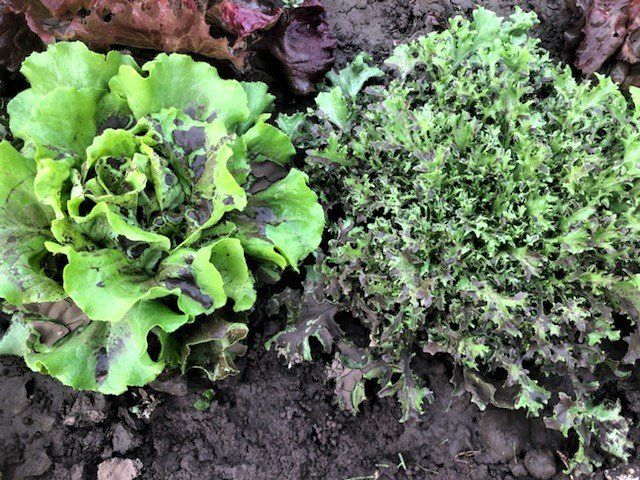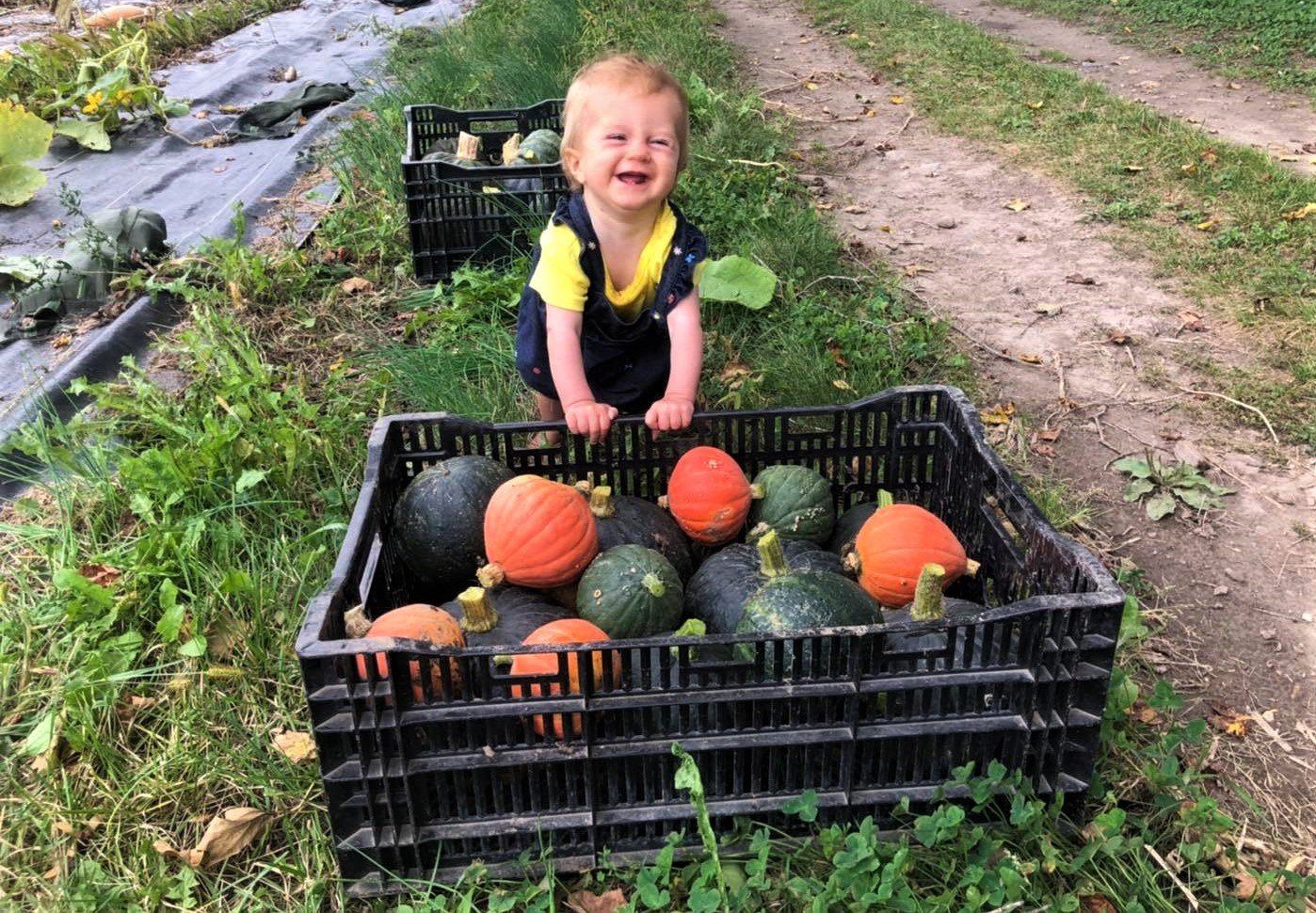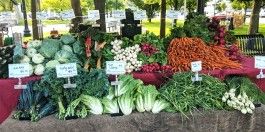September 30, 2021
The Lettuce Rejoice!
Firmly Rooted Farm's Newsletter for their Veggie Loving Farm-ily

On the Farm: The Power of Food
Hello again my veggie loving friends,
I’ve been lamenting over the influence of food in my own life as of late. I’ve never held a job outside of the very vast and far-reaching food industry. I’ve worked all along the supply chain, from production to retail to restaurants. It sometimes seems like I take my love for food for granted; it’s always been there, and I forget just how influential food has been in my life. I recently canned peaches and reflected on my relationship with my grandmother, how I wish I had taken more time to learn from her the skill of growing and preserving food. As a kid, I tended to view these as simple domestic duties devoid of meaning beyond obligation, although my view has shifted to see them as acts of independence, kinship, love, and care for our environment. Today I found myself cooped up studying for hours, stressed by the amount of reading I had before me, annoyed with the prospect of stopping to eat. I went to the garden and suddenly found calm as I realized how many ripe tomatoes I could pull from my plants. I sometimes get lost in the complexities of the world that I forget the simplicity of standing in a garden, or sharing joy over harvest, or smiling at the possibilities in nourishment.
I recently watched a video in which Anthony Bourdain discusses his views on food. He reveals that many wish him to keep politics out of his work, but what is more political than food? Whether people have food or not, what kind of food they can access, the nutritional value of that food, all tell a story of their lives, the economy, the politics of a nation. Food tells us the influences that shape a culture, the struggles, hardships, triumphs, inequalities, and the gifts they take for granted such as abundant agricultural land. Food tells us who is wealthy and who is poor, not just on an individual basis but as entire countries. Who can feed its people?
Food can tell the history of a nation. I once visited Iceland and indulged in Hákarl. Indulged may not be the right word, for Hákarl isn’t what you might first eat to spoil yourself, for it’s quite literally spoiled itself. The dish I’m talking about is a fermented or “rotten” shark, which has also been hung to dry for several months. The experience was like nothing else. They serve it in a sealed container, quite unassuming and curious at first. When opened, the overwhelming scent of ammonia chokes and burns, provoking the thought that maybe this wasn’t such a great idea after all. But I pushed on; I’d heard stories of Gordan Ramsay vomiting after consumption and Anthony Bourdain describing it as the “single worst, most disgusting and terrible tasting thing” and I needed bragging rights. I almost cannot remember the texture, I was so focused on intaking oxygen while consuming the shark in an attempt to prevent myself from gagging on the smell of ammonia that the taste and texture were difficult to comprehend. I would describe the texture as chewy and the taste as fishy, and the scent as breathtaking. I quickly chewed the putrid meat and followed it with a shot of Brennevin, strong alcohol native to Iceland. Despite being almost 40% alcohol, it was like drinking water in comparison to my mouth’s recent excursion. Why would the Icelandic people ever eat such a thing? Because Iceland used to be a poor country, with very little arable land and infrequent trade. Before reliable food preservation methods like refrigeration, and with little agricultural goods domestically, food was scarce, so they ate what they could and preserved in any way that didn’t kill them, quite frankly. Today Iceland is a much wealthier nation, which has harnessed the power of geothermal energy to increase its agricultural capabilities, and increased trade has contributed to a more relatable and diversified food supply. Now Hákarl is a delicacy among those brave tourists with stomachs and noses of steel (I’m proud of this experience if you couldn’t tell). But how incredible, that this one food item, on its journey from subsistence food to delicacy, can tell the economic, cultural, and agricultural history of one nation.
When I look around me, I am surrounded by people who love food. But so many in our Canadian society have lost the overwhelming power that is a deep appreciation for food. I don’t say this to shame those who have lost it but to express compassion for what I see as a deeply missed experience. Food is beyond the function of ingesting calories – there is a connection between the soil, our gut, and our genetic memory. As such, we develop a deep relationship with the food we eat, almost a kinship. It used to be common practice to nurture, love, work, and labour over our food. But so many in the Western world have forgotten this. As our society has developed, we have lost that love, that solidarity with that which nourishes us. Advancements in agriculture have brought wealth and abundance as well as isolation from the heart and soul of nourishment. I am not about to become a Luddite, but sometimes I wonder if the advancement of our society was worth it if we as a whole have generally lost the passion for food and our Mother who provides its nourishment. Some still maintain it. We feel that deep love, that stirring in our soul, that draws to the wholesome power that is food. It’s ultimately hard to describe. Food is everything, it is one phenomenon that binds all living beings, from photosynthesizing algae to the gold leaf-eating wealthy, we all need to eat. Sometimes I sit and attempt to fathom the power of food, the inherent politicization of food, the exploitation, the cultural significance, the relationships born of shared love, and marvel at the complexity food brings to life. There is nothing quite like the power of food.
Kitchen Corner

Michelle with her beautiful cauliflower baby
The cauliflower is coming! We are having a tough time producing cauliflower and broccoli this season, but at last we have a sample.
One of the many vegetables to pulled from the genetics of brassica oleracea. Everyone seems to want to turn cauliflower into something else. Whether it be steaks, wings, or rice, cauliflower may have a bit of an identity crisis. But on its own, it’s still divine. I enjoy cauliflower sectioned into bite-size pieces and then roasted with a little oil, salt, and spice of some kind, often fresh turmeric or paprika. Delicious!
Kitchen Clean-Up
We are fighting a battle against the slugs. With the rain and cooler weather, they seem to come out in full force. We’ve taken care of the worse of the damage, but you may find the odd hole. They particularly enjoy bok choi and kale, as well as radish greens despite their hairiness. We also have no spinach to offer this week but will have lots next week!
That’s all for now folks, happy eating until next time!
Farmer Erika




